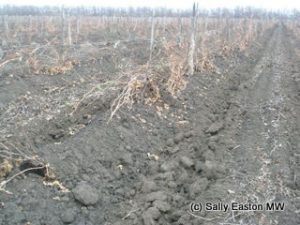Vedernikov Winery

Maxim and Valery Troychuk
Valery Troychuk and his son Maxim, who’s studying in the UK, are working with indigenous Russian grapes on their 200 hectares of vineyard, situated in the chilly Rostov region, where vines need to be buried to survive the winter.
Their Vedernikov winery is 160km from the city of Rostov on Don, in one of the world’s most northerly areas of wine production. The Troychuks are proud to say it is on the right bank of the river Don – the original, historic Russian area of the Don Cossacks. The left bank Maxim said “belonged to the Ottoman empire, and winemaking was not popular!”
Troychuk senior took control of the winery, which had been founded in 1970, in 1999, and has been building the vineyard holding since then. It wasn’t until 2005 that they produced their first vintage of ‘premium’ wine, a concept that appears to distinguish wine in Russia from the cheaper, everyday wine, which, we are told, is often not entirely made of Russian-grown fruit. As if to confirm this, Troychuk junior said “our premium wines are 100% our own fruit.”
Nearly three-quarters of the vines here need to be buried in the winter. The cost to cover and uncover these vines, said Troychuk senior “is 50% more expensive than not covering.” It is only the hybrid varieties, bred to survive the conditions, that can stand through the winter, which gets down to -25 to -28°C. He suggested that if vines have to suffer to produce good wine, then his should be producing good wine indeed!
Summer is pretty tough too, getting up to 38 to 40°C, so vines need to be hardy at both ends of the temperature spectrum.

Buried krasnostop
Krasnostop is a high order black Russian variety, but there are two clones, explained Maxim. “Krasnostop zolotovsky is our pride. It’s one of the best grape varieties in the world. Zolotovsky is near to us, a geographical place. Krasnostop originates from this area.” This is a variety that is high in alcohol, high in acid, high in tannin, high in everything, including flavour. Troychuk senior described it as “a natural athlete”. The other clone is Anapsky, from closer to the Black Sea.
Other key indigenous varieties Vedernikov work with include the impressive sibirkovy (white), and tsimlyansky chorni (black). They also have some rkatsiteli that does well.
Tasting, in situ, November 2012
Vinodelnya Vedernikov, Donskaya Chasha, Rkatsiteli 2011
Aromatic lime pith. Lemon grass, sauvignon blanc-spectrum of zestiness and citrus fruits. Light attack, grassy, nice fresh intensity of immediate fruit, light-body, in citrus, lime, melon, greengage flavour spectrum, all in a good, straight line. Lots of green flavoured fruits. Good.
Vinodelnya Vedernikov, Aligote 2011
Lemony nose, less aromatic than rkatsiteli; more neutral and vinous. Fresh, with decent volume, white stone-iness on the core. Palate more interesting in stoney lines rather than fruity lines. Has a bit of substance to mid palate but doesn’t jump out of the glass to greet you. Decent length.
Vinodelnya Vedernikov, Sibirkovy 2011
All stainless steel. Grass, white flower, lemongrass, fennel leaves. Hint of reductive sweat. Round palate entry, with some perky plushness, good volume of fruit, in zesty, pithy, canteloupe melon, lemongrass spectrum. Round and balanced with bruised apple on the core. Good intensity and concentration. Good length Interesting and flavoursome, with attractive balance. Vg.
Vinodelnya Vedernikov, Sibirkovy 2011
With oak, 2nd fill. 75% in oak, 25% with no oak, for 6 months
Supports the oak pretty well, but mutes fruit aromas. Bit gorse-like and citrus, round and with tannin/phenol element that the fruit doesn’t really support. Oak is done well, but at the expense of the purity of the wine/ fruit. Demerit for oak I’m afraid. Then we are told they have decided not to use oak at all in the 2012 vintage.
Vinodelnya Vedernikov, Gubernatorskoye Riesling 2011
Lime pith, supple acidity effect. Plenty of extract to give body and feel. Aromatic green flavours, (not that I see in Germany/Austria/Australia), like tasty stalks of something soft maybe pea shoots, samphire or something. Something young, sweet, soft and barely crunchy. Lovely texture/integrity, with limey finish and good length.
Vinodelnya Vedernikov, Tsimlyansky Cherny 2011
Cask sample, 100% new oak. Toasty, and grainy notes, quite a raw oakiness, but suggests it will become integrated – huge fruit concentration will absorb the oak. Bright and sweet cherry palate core, with some mid palate floral aromatics, more tannin here, obviously from the oak. Well balanced. Chewy finish tho’ which will soften in.
Vinodelnya Vedernikov, Pravoberezhnoye 2011
50% cabernet sauvignon, 35% tsimlyansky, 15% krasnostop.
Medium deep cherry colour. Not hugely aromatic, more spicy, with spicy palace attack – clove, liquorice root. Huge spices, sour cherry, firm acidity, and freshness with intensity in its medium bodied weight. Good, with good length.
Vinodelnya Vedernikov, Krasnostop 2010
All stainless steel. Bright mulled-spice cherry notes. Smooth attack, sweetly-spiced, with rich mulberry and dark-chocolate, even with dark-choc/bitter orange skin combo. Sweet forest-berry fruited, youthful as anything, succulent with fresh/firm core. Supple plentiful tannins, proportioned and toned. Big with 14.5% integrated. Delicious. Vg.
Vinodelnya Vedernikov, Krasnostop 2010
Fermentation in stainless steel, then 50% in to new oak for one year.
Toasty spices are the first nose, fruit is muted on nose and on the palate attack. Toasted spices and a grip on the side palate which detracts. Nice enough oak, though chewy to sides and finish. Good but not as exciting for me as the same wine only in stainless steel.
My visit to Russia was sponsored by the Union of the Oenologists and Winemakers of Russia.



